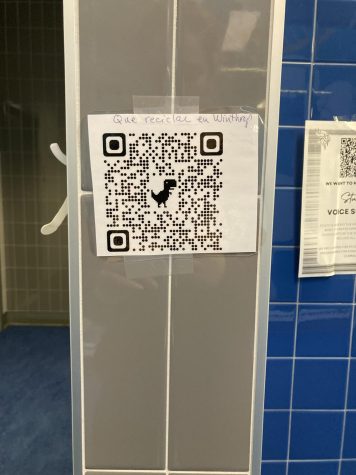Winthrop High School’s Stem Club Is Taking Matters Into Their Own Hands
May 6, 2023
One of the many issues we have on this planet is the waste we gather from using its materials. Because we simply cannot find a way to get rid of the waste without toxins entering our atmospheres and polluting our oceans and land, we turn to recycling.
It is an environment friendly process that takes all that waste and converts it into something that can be reused in our everyday life. Things such as water bottles can be recycled into art or a pair of jeans.
You’ve probably seen the blue bins in and out of the school classrooms and in the workplace. It’s part of the rising movement to stop this planet’s course on becoming a polluted wasteland.
But the side of the story you might not know comes from Winthrop’s own High School; The Stem Club!
Ms. Baker and the Stem Club are now looking for ways to get rid of the waste that runs through our town. After a meeting with Wendy Miller-Page, the club came to learn that the town is “running out of space to put our waste.”
Winthrop pays per ton to remove said waste, and if it does not get recycled it goes to the landfill or it gets incinerated. The bad news is we breathe in those toxins either way.
If we burn things such as plastics, we release chemicals such as dioxins, furans, mercury and polychlorinated biphenyls–all known as BCPs. Chemicals like dioxins can be released in natural disasters such as forest fires which in return infiltrate our bodies and can cause health issues such as reproductive and developmental problems, damage the immune system, interfere with hormones, and also cause cancer.
According to Ms. Baker, recycling might not be the solution to breaking down items, but it might actually be used as “an excuse to use more.” The “best solution” would be to “reduce the single-use items we consume.”
I caught up with Delia Parco about the Stem Club’s latest program in reaching out to their audience. “Everyone is working on things like posters and infographics that teach people about sustainability but also focus on recycling,” she said. “We will be putting these on a bulletin board on the third floor as a hub of information for the students of Winthrop High School to educate them on which waste to put in which bin!”
One of the many issues we have on this planet is the waste we gather from using its materials. Because we simply cannot find a way to get rid of the waste without toxins entering our atmospheres and polluting our oceans and land, we turn to recycling.
It is an environment friendly process that takes all that waste and converts it into something that can be reused in our everyday life. I myself have bought a few pairs of recyclable jeans, made from the plastic that has polluted our oceans.
You’ve probably seen the blue bins in and out of the school classrooms and in the workplace. It’s part of the rising movement to stop this planet’s course on becoming a polluted wasteland.
But the side of the story you might not know comes from Winthrop’s own High School; The Stem Club!
Ms. Baker and the Stem Club are now looking for ways to get rid of the waste that runs through our town. After a meeting with Wendy Miller-Page, the club came to learn that the town is “running out of space to put our waste.”
Winthrop pays per ton to remove said waste, and if it does not get recycled it goes to the landfill or it gets incinerated. The bad news is we breathe in those toxins either way.
If we burn things such as plastics, we release chemicals such as dioxins, furans, mercury and polychlorinated biphenyls–all known as BCPs. Chemicals like dioxins can be released in natural disasters such as forest fires which in return infiltrate our bodies and can cause health issues such as reproductive and developmental problems, damage the immune system, interfere with hormones, and also cause cancer.
According to Ms. Baker, recycling might not be the solution to breaking down items, but it might actually be used as “an excuse to use more.” The “best solution” would be to “reduce the single-use items we consume.”
I caught up with Delia Parco about the Stem Club’s latest program in reaching out to their audience. “Everyone is working on things like posters and infographics that teach people about sustainability but also focus on recycling,” she said. “We will be putting these on a bulletin board on the third floor as a hub of information for the students of Winthrop High School to educate them on which waste to put in which bin!”

As effective as this practice is, this movement cannot be done alone. Be sure to spread the word and recycle as much as you can!
Find out more at: https://recyclesmartma.org/smart-recycling-guide/
As effective as this practice is, this movement cannot be done alone. Be sure to spread the word and recycle as much as you can!




Heidi Baker • May 11, 2023 at 11:55 am
Thanks for the article Mira! Recycling plastic, cans, bottles and paper can be an effective way to reduce waste, if we do it right. Curbside composting is now an option for reducing food waste at your home!